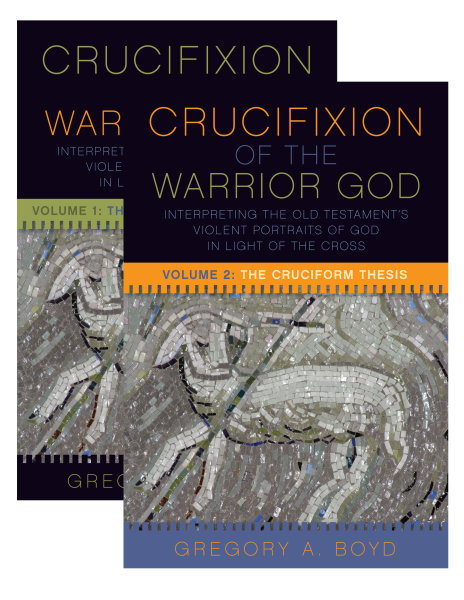The Crucifixion of the Warrior God: The Cross of Christ and the Revelation of God
Renowned pastor-theologian Gregory A. Boyd proposes a revolutionary way to read the Bible in this epic but accessible study. His “cruciform hermeneutic” stands as a challenge to the field of biblical studies and to all thoughtful Christians.
A dramatic tension confronts every Christian believer and interpreter of Scripture: on the one hand, we encounter Old Testament stories of God commanding horrendous violence. On the other hand, we read the unequivocally nonviolent teachings of Jesus in the New Testament. Reconciling these two has challenged Christians and theologians for two millennia.
Throughout Christian history, various answers have been proposed, ranging from the long-rejected explanation that these contrasting depictions are of two entirely different “gods” to recent social, cultural, and literary theories that attempt to dispel the conflict.
The Crucifixion of the Warrior God takes up this dramatic tension and the range of proposed answers in an ambitious constructive investigation. Over two volumes, Gregory A. Boyd argues that we must take seriously the full range of Scripture as inspired, including its violent depictions of God. At the same time, he affirms the absolute centrality of the crucified and risen Christ as the supreme revelation of God.
Developing a theological interpretation of Scripture that he labels a “cruciform hermeneutic,” Boyd demonstrates how the Bible’s violent images of God are reframed and their violence subverted when interpreted through the lens of the cross and resurrection. Indeed, when read in this way, Boyd argues that these violent depictions bear witness to the same self-sacrificial nature of God that was ultimately revealed on the cross.
Interview with Gregory A. Boyd on the Nomad Podcast
A dramatic tension confronts every Christian believer and interpreter of Scripture: on the one hand, we encounter Old Testament stories of God commanding horrendous violence. On the other hand, we read the unequivocally nonviolent teachings of Jesus in the New Testament. Reconciling these two has challenged Christians and theologians for two millennia.
Throughout Christian history, various answers have been proposed, ranging from the long-rejected explanation that these contrasting depictions are of two entirely different “gods” to recent social, cultural, and literary theories that attempt to dispel the conflict.
The Crucifixion of the Warrior God takes up this dramatic tension and the range of proposed answers in an ambitious constructive investigation. Over two volumes, Gregory A. Boyd argues that we must take seriously the full range of Scripture as inspired, including its violent depictions of God. At the same time, he affirms the absolute centrality of the crucified and risen Christ as the supreme revelation of God.
Developing a theological interpretation of Scripture that he labels a “cruciform hermeneutic,” Boyd demonstrates how the Bible’s violent images of God are reframed and their violence subverted when interpreted through the lens of the cross and resurrection. Indeed, when read in this way, Boyd argues that these violent depictions bear witness to the same self-sacrificial nature of God that was ultimately revealed on the cross.
Interview with Gregory A. Boyd on the Nomad Podcast
$59.00
